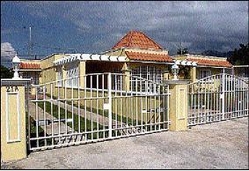Where do the children play?
Published: Sunday | December 6, 2009

Ian Allen/Staff Photographer
Who would believe that this was once an old-style home? It has been transformed into a modern, gated complex.
A SOCIAL worker has sounded the alarm at the way in which many urban areas, especially gated communities, appear to be developing.
Patrice Samuels, who is also a childcare specialist, has expressed dismay at the abundance of concrete and very little grass and plants in some of these developments.
"When you look at some of the developments, some of the complexes and gated communities, they don't have enough green space and play space for children," Samuels told The Sunday Gleaner.
She argued that green space was "very important in terms of our mental development. Green helps to relax the body".
"You also need play space where your children can live. So in terms of physical development, when we are developing our gated communities, we should consider green space and play space, because we are not developing a space for robots. We are developing a place for people - for families for communities," Samuels said.
But psychologist Dr Jeffrey Walcott says the encroachment on space is a greater issue in gated communities than green spaces.
"Boundary-setting violations and difficulty in relating to others are some sources of conflict within these housing set-ups," Walcott said.
He added that the issue of green space was "overblown" and that there was no conclusive research which indicated that seeing trees would either help or hurt an individual's development.
"There are some persons who don't have any horticultural appreciation and yet they have no problem relaxing," Walcott said.
THERE APPEARS to be a growing trend where persons are erecting barriers to keep others from entering their communities.
Robert Kinlocke, geography doctoral candidate at the University of the West Indies, Mona, told The Sunday Gleaner that whether there existed a wall and gate, or old oil cans and board crates, the move was a reflection of fear, fragmentation and failure.
Kinlocke, who has been studying the issue of gated and garrison communities, said the establishment of protective mechanisms in these areas indicates that the residents are not willing to allow the State to be in total control of their security and well-being.
"People feel much safer when they are in charge of their own security, and it matters very little where these persons reside," Kinlocke said.
In most of Jamaica's inner-city communities, residents have erected physical barriers at the entrance to these communities, and there are persons who decide who is to be admitted, and under what circumstances. In the absence of physical barriers, there are clearly defined areas of boundaries as to where persons may or may not enter.
"People put up these barriers out of fear and out of what they consider a duty to protect members of their communities from invasion," Kinlocke said.
But it is not just inner-city communities that are putting up barriers. Kinlocke told The Sunday Gleaner that he had counted more than 230 gated communities in Kingston and St Andrew. These communities, he said, were gated because people felt safer when they were behind the high walls and broad gates.
"The level of fear in both forms of communities is significantly reduced because of their residential arrangements. This is the reason people construct boundaries in the communities - whether uptown or downtown - to mitigate against fear," Kinlocke said.
Some sociologists have argued that the proliferation of these gated communities has retarded the potential of the country to grow. But despite these comments, Kinlocke said he would be the last person to encourage their discontinuation.
Limited land space
He said the gated communities were a pragmatic approach to dealing with limited land space in urban areas and should supersede the desire to reduce class boundaries within societies.
Meanwhile, Minister with Responsibility for Local Govern-ment, Robert Montague, has expressed doubt that a proliferation of gated communities could hinder national development.
"The ideal community ought to be towards everybody integrating, but at the same time, you must recognise that you have persons with negative social attitudes in terms of integration," Montague said.
"Whether you live behind the gate or before the gate, there are people who are just not community-minded," Montague told The Sunday Gleaner.
According to the government minister, persons shy away from community meetings, irrespective of the socio-economic group.
"In the richest communities you have citizens' association meetings and you have some people who are just not coming out because they are not community-minded," Montague said.
He argued that there were communities in which persons would not live because even though they were not gated physically, they were gated economically, or gated socially.
"There are persons who live outside of Jamaica and they are helping to develop Jamaica. There are persons who live outside of a parish, but their heart and spirit are within that parish and they will do everything to seek to develop that parish and that community," Montague said.
He added: "Gated communities do not dictate a man's community spirit or his attitude towards developing a community. You have people within an open community, who, if you have a community meeting, will not participate. I am not worried that we seem to be having more gated communities. What I would worry about is that we are throwing our hands up in the air in the face of a perceived high-crime problem," Montague said.
- D. L.









